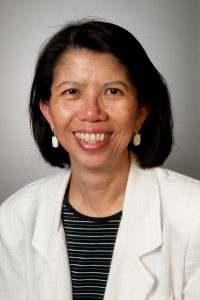Neurologist Brenda Wong Heads New Specialized Duchenne Clinic at UMass

Brenda Wong, MD, of UMass (left) with Debra Miller, co-founder of CureDuchenne. (Photo by Larry Luxner)
For nearly half a year, Brenda Wong, MD, has led New England’s first and only interdisciplinary clinic devoted exclusively to boys and young men with Duchenne muscular dystrophy (DMD).
The Duchenne Program at UMass Memorial Medical Center is located in Worcester, a 45-minute drive west of Boston. The clinic, launched in July, provides integrated care for Duchenne patients and also offers physical therapy, nutrition, social work, child life, and orthotics support.
Wong said her goal is to improve the outcome for Duchenne patients in all aspects — physically, mentally and socially.
“We may not find a cure, but if we are able to support them and provide them with the systems to enable good health, then I think that’s what our job is,” she told Muscular Dystrophy News. “These boys are sometimes very severely handicapped and they don’t move, but they’re still smiling every day.”
Wong’s team consists of 10 professionals. She and many of her colleagues — including cardiologist Michael C. Fahey; pulmonologist Ted Kremer; endocrinologist Penny Feldman; and nurse practitioners Emily Young and K. Courtney Shellenbarger — spoke Nov. 4 at the two-day Futures conference in Needham, Massachusetts.
That event was organized by Debra Miller, founder and CEO of CureDuchenne.
“There are so many things that set Brenda apart, but the one huge thing is how she looks at each patient individually, and doesn’t have a set formula to treat every patient the same way,” Miller said.
Interested in Muscular Dystrophy News research? Sign up for our forums and join the conversation!
From Cincinnati to Worcester
Wong studied medicine in her native Singapore, completed training as a pediatric neurologist in Scotland, and came to Cincinnati Children’s Medical Center in the mid-1990s on a fellowship.
After a stint in London, she returned to Cincinnati in 1999 as a faculty member and, in 2005, launched that institution’s pediatric neuromuscular program. Besides Duchenne, the program also treated kids with spinal muscular atrophy (SMA), Charcot-Marie-Tooth disease, and other rare illnesses.
Since 2000, Wong has treated more than 800 patients including Hawken Miller, the 21-year-old son of Debra Miller and her husband, Paul.
“It’s been a long journey. I’ve seen some of these boys since they were 5 years old,” Wong said. “Hawken was 11 when I first saw him. Now he’s graduating from college. We’ve also learned a lot from the resilience of these kids. It’s amazing.”
In February 2015, Wong received CureDuchenne’s annual Cares Award in Newport Beach, California, for her commitment to improving the lives of boys and young men with Duchenne muscular dystrophy.
“I left Cincinnati because of the opportunity to focus just on Duchenne,” she said. “I arrived here in mid-May, and after a preparation period of two months, we launched the Northeast’s first DMD program on July 11, seeing 100 patients in the first three months.”
The Duchenne Program at UMass operates on a $6 million, five-year budget, with the Massachusetts-based nonprofit group Charley’s Fund providing the vast majority of that funding, as well as hands-on support to ensure the program’s success. Additional support comes from the nonprofit foundations Hope for Gus and JB’s Keys to DMD.
The new clinic “is the culmination of extensive research and planning that Charley’s Fund started three years ago, when we determined that shoring up the clinical care and clinical trial infrastructure was a critical priority to ensure Duchenne research keeps moving forward as quickly and efficiently as possible,” the fund’s founder, Tracy Seckler, said in an email.
Steroid use still ‘standard of care’
Wong said that unlike SMA — which is now being treated with the Biogen therapy Spinraza (nusinersen) — Duchenne hasn’t yet seen any breakthrough “miracle” drug capable of halting, or even reversing, symptoms of the disease.
“In terms of a big clinical meaningful change like you see with Spinraza and SMA, not as yet. It’s been rather slow,” Wong said, adding that for now, Duchenne is best treated by approved steroids such as Emflaza (deflazacort), Exondys 51 (eteplirsen), and Translarna (ataluren).
“Steroid use is the standard of care. Either you stop walking at the age of 10, or you can walk until 15,” she said. “Fourteen is the mean age of loss of ambulation for Duchenne patients who are on daily steroids.”
Wong disputes suggestions that steroids are to blame for the massive weight gain frequently seen in Duchenne boys. Rather, she said, it’s largely a reflection of the “epidemic of obesity” plaguing the United States and most of the developed world.
“My job is to provide parents with all the information; then they make an informed decision,” she said. “I always tell them, ‘when you have side effects from steroids that are not acceptable, we can always back off.’ But my advice is to give it a try. One nice thing about steroids is that if you back off, all the side effects go away. You grow taller, you lose weight, and your bones get better.”
Wong added that she discourages parents from treating their sons with tamoxifen — a $20-a-month, prescription-only breast cancer drug that some researchers have linked to improved outcomes in Duchenne, without any of the side effects.
“I usually talk to families about the standard of care, what is evidence-based treatment versus investigational. We distinguish between a treatment and unconfirmed efficacy, and weigh the risks,” she said. “We don’t know the benefits, but tamoxifen is not a vitamin that we can use easily in kids. It’s a drug for cancer patients. It’s never been used in kids, so I think the risks are quite high.”








